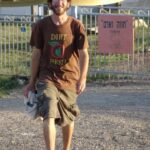Jerusalem
Yom Ha’atsma’ut / Israel Independence Day – 20th day of the omer 5766
Wednesday May 3rd 2006
Here’s how I arrived in Israel yesterday – in the waning afternoon hours of Yom Hazikaron, Israel’s memorial day, and just ahead of Yom Ha’atsma’ut, Israel’s Independence Day, last night and today.
I walked through customs at Ben Gurion airport at 4.30pm. Yigal Deutscher met me at the airport; less than half an hour later I was walking around Chava v’Adam, visiting his new Shorashim project. I’ll explain what that is in a minute and why it was so amazing, but first a word about Yigal.

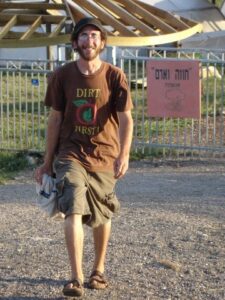 Yigal’s now 25. He grew up in Queens; went to the Yeshiva of Central Queens and then Yeshiva University High School. I first heard from him a few years ago. He’d graduated from Queens College in creative writing, and was working – not terribly happily – for the New York City Dept of Planning. He was actually planning bike lanes and got in touch with me to see if Hazon might have a job for him.
Yigal’s now 25. He grew up in Queens; went to the Yeshiva of Central Queens and then Yeshiva University High School. I first heard from him a few years ago. He’d graduated from Queens College in creative writing, and was working – not terribly happily – for the New York City Dept of Planning. He was actually planning bike lanes and got in touch with me to see if Hazon might have a job for him.
Hazon, sadly, did not – we’re not up to building bike lanes in New York just yet and our full-time staff at that time was about two-and-a-half people. But I thought he was a lovely guy – idealistic, searching, aware of some of the ways that we’re messing the world up. I did what I not infrequently do with someone like that – I put him in touch with Adam Berman.
Adam had not long since taken over the soon-to-be-renamed Isabella Freedman Jewish Retreat Center, and was plotting ADAMAH, a new program to introduce 20-somethings to organic farming and Jewish intentional living.
So in the fall of 2003 we gave a first grant of $3,600 to ADAMAH, and Yigal became one of its first fledging members. He stayed for a year, by which time the program was officially underway (and the ADAMAH-niks moved into the house that was bought with a $20,000 downpayment from Hazon’s 2004 New York Jewish Environmental Bike Ride). In the next 18 months he traveled to Israel and wrote about organic farming for an American journal; then went to California to take an intensive 6-month advanced program in organic farming; and then he came back to Israel, searching for some way to put these pieces together.
Last fall when we first announced that we were inviting people to apply for mini-grants from the 2005 New York Jewish Environmental Bike Ride, Yigal was one of the people we heard from. His was one of two grants that we met in full. In going straight from the airport to Chava v’Adam I was going to see where some of our money had gone.
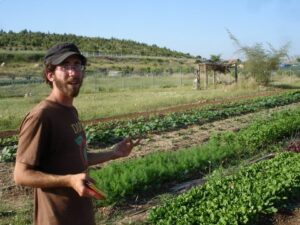
“Chava v’adam” is another of these Hebrew plays on words. If you pronounce the first word with the accent on the first syllable then what you’re saying is “eve & adam”, as in “adam & eve.” But if you put the accent on the second syllable then the word chava means farm, and the phrase as a whole means something like “farm & human being”. (I love that in hebrew, etymologically, the word farm derives from, as it were, the first earth mother; because the process of generating life necessarily derives from the ur-mother of all life.)
But what Chava v’Adam actually is, in this context, is a few acres inside Modi’in, in central Israel, that have recently been transformed. When most Israelis think of Modi’in, they envision a sort of commuter suburb, in the middle of the country. Row after row of not-terribly-pretty small apartment blocks. Clean and tidy but lacking a certain amount of soul. (If I’m dissing people in Modi’in then I apologize at this point.)
A little while ago, a fellow called Itzik Gazieli (whom I don’t know) persuaded the educational authorities in Modi’in to let him take over a small piece of land (but a rather pretty piece of land, in which rather miraculously one can look in any direction and not see modern buildings) and let him set up there an experimental school program, to teach kids about ecology. He called this Chava v’Adam.

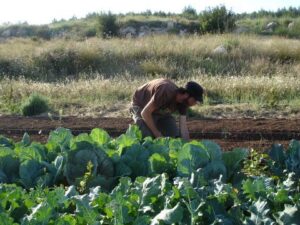
And this is what Yigal wandered into last fall. By January he had persuaded Itzik to let him take over the running of the actual farm, and create there a program that Yigal has called Shorashim – roots. With the intention of attracting 20-somethings and, again, teaching them not just organic farming but also community-building and, to some extent, the possibility of the renewal of Jewish life in ways not imagined by most of them.
And now, just four months later, the place is growing and blooming. They ploughed the land and put compost on it and got a roto-tiller and created raised beds. They used some of the money from our Ride last year to bring from abroad organic (in many cases heirloom) seeds. There’s a greenhouse, with a variety of seeds in pots in early stages; then an intermediate house; and then, in the raised beds, a great delight of new crops. (Also geese – rather dangerous-looking if you ask me, but perhaps they just don’t like the English.) Yigal had an order to deliver to someone in Jerusalem later that evening, so we went out together and picked beets, mustard greens, dill, cauliflower, cabbage, kale, bok choy and arugula. It was pretty cool just picking this stuff, even before Yigal suggested that the baby beets tasted really great fresh from the ground. There’s a fine photograph of me looking like some strange vegetarian Dracula, with a beet-colored smile and beet juice dripping down my chin, waving a half-eaten beet in the air.
You always learn something on occasions like this. I can still remember, aged about 22, walking through a park in London, seeing a duck dive into a pond and then come up again, and only at that moment understanding the origins of the phrase “like water off a duck’s back.” My metaphor-come-to-life moment yesterday was when I asked about some huge red kale plants. “Oh,” said Yigal, “they’re there because they’ve gone to seed…” And it turns out that the phrase “gone to seed” describes a plant when it’s mature, too mature probably to pick or to eat, but which is now generating seeds – as opposed to leaves – which in this case the Shorashim-niks will pick and save and then plant in due course. Who knew? (OK: if you’re someone who did know – chalk my ignorance up to a rather narrow English education.)
Where, you might ask, does Yigal live, and who’s doing the tilling and planting and watering and picking and so on? (So glad you asked…)
In the way of these things – and as a sign of the times – almost as soon as he decided to create Shorashim, people started to show up. He has an Israeli partner, Idan (who’s specialty, prior to farming, was forensic science, which he did in the Israeli army), and four or five Shorashim-niks – Israelis and Americans – who are now coming to Chava v’Adam in five month periods to learn, as Yigal did at ADAMAH, about organic farming and intentional Jewish community. Three of them were away for Yom Ha’Atsma’ut, but I rode back into Jerusalem with Shoshana Wylen, another ADAMAH-nik who arrived a week ago and whose calm measured comment, when I asked her how the first week had gone, said “It’s the most fulfilling life I can imagine – nothing makes me feel more complete – you only really know a place when you farm it – and doing this in Israel is incredible…” (I asked her what she’d been doing before she got to Chava v’Adam, to which the reply was “working for an accountant in Muncie…” [Let us, by the way, not knock accountants: not only is my father an accountant, but so are both Yigal’s father and mother.])
Yigal, Shoshana and the others are living in what they call “the hoops.” They’re simply metal skeletons, about 15 feet in diameter, over which burlap sheets have been thrown. They’re essentially Bedouin tents; I have to say that I thought Yigal’s was rather homely. (The money for the hoops also came from the mini-grant we gave to Yigal – you can see both that we didn’t give him very much money, and that it went a long way…)
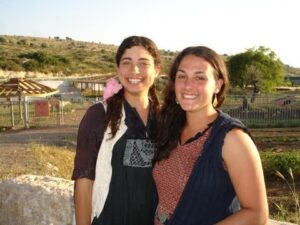
The community-building is flourishing. They held their own seder, with 20 people, on the ground, right in the center of the farm. For many of the Israelis it was their first experience of Jewish tradition brought to life. There’s a young rabbi from Bat Ayin, Shaul Judelman, who’s coming in to teach a weekly eco-beit midrash. Just this week, they’re launching their own CSA (Community-Supported Agriculture project), only the second in Israel. (The CSA doesn’t have a name yet – I said that I thought “Tuv Ha’Aretz would be a fine name… perhaps next year they’ll actually become an official Tuv Ha’Aretz site, and link up with the CSAs we’re helping to launch in the States, which would be very cool indeed.)
(If anyone reading this is in Jerusalem or Tel Aviv or Ra’nana and would like amazing local organic vegetables delivered every week from one of the finest young farms in the whole world, then call Yigal on 054 217 7279 or Idan on 054 588 3132.)
When I asked Yigal to share his vision for the development of Shorashim, these were some of the things he said:
- To create a farm that’s regenerative of the soil – “that’s literally creating security for Israel by securing the basis of life here”
- To start a seedbank to share with other organic farmers
- To create a co-operative of organic farms (coming together to work on marketing and education and other things)
- To create farmers’ markets in Jerusalem and Tel Aviv
- To donate food to local homeless shelters and people in need
- To continue to develop the community-building aspect of the program
- To teach about permaculture, food preservation, green building – simply to teach, very intensively, a wide range of practical skills for all the people who live there
- To show the spiritual face of Jewish life, especially to Israelis or people of relatively little Jewish background
- To encourage bartering – so that people can barter for shares in the CSA if they have something to teach (he’s still looking for a yoga teacher) or something they want to share.
As we drove into Jerusalem, and as I unpacked last night with the TV in the background, showing the end of Yom Ha’Zikaron and the ceremony that marked the start of Yom Ha’Atzma’ut, I found my thoughts swirling in all sorts of directions.
One was about the impact of ADAMAH as an institution, and Adam Berman as a teacher and leader. Yigal was incredibly grateful to Hazon for supporting him and to me for being supportive, and I’ll say a little more about that in a minute. But it’s clear that what Yigal is doing is creating something very much in the image of ADAMAH, and just huge kudos to Adam for this new offshoot of the garden he’s planted. In Israel things sometimes move faster and more informally than they do in the US, and get by with not much money, and the extent of Yigal’s achievement, in a brief period of time and with very few resources, is phenomenal. There’s something very special about seeing the way that a century-old Jewish institution in Falls Village, CT can have such inspirational influence in Israel today.
And I was struck by how unlikely it was that in 2006, 58 years after the establishment of the State of Israel, and more than a hundred since the first aliyah that marked the beginnings of modern large-scale Zionism – that I’d just spent the late afternoon and early evening with someone whom I can only thing of as one of the last of the chalutzim. The word means pioneers, and it signifies especially the early Zionists who learned to work the land for the first time. Yigal really is a chalutz, and so are the people around him. They’re part of the ongoing work of renewing the Jewish people, renewing this country, and renewing our connection with the physical world around us.
I’m here in Israel because beginning a week from today – please G!d – I’ll be one of more than 120 people who cycle from Jerusalem to Eilat on our 4th Arava Institute Hazon Israel Ride: Cycling for Peace, Partnership & Environmental Protection. The focus of that Ride is the MA in Environmental Leadership at the Arava Institute, which brings together in an incredibly inspirational way Israelis (both Jewish and Palestinian), Jordanians, Palestinians and Americans. When you cycle the country you see at first hand how small Israel is, and how pressing some of its environmental challenges; and when you meet the Arava students you learn how the environmental challenges of Israel and of the region are generating some of the most outstanding and inspirational people I know.
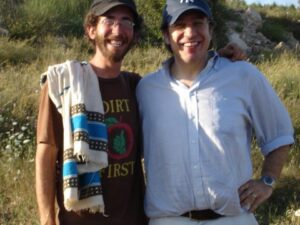
Spending time with Yigal yesterday was a reminder that connecting to land can renew Jewish life as well as help to build peace. The ultimate impact of the original chalutzim, though they were few in number, was immensely magnified in history because of who they were and what they did. I have not a shred of doubt that the same will be true of Yigal and, more broadly, of the other people who are re-connecting to land, to community, to peoplehood, to Jewish tradition, and to peace, in a variety of separate but intertwined ways, in Israel (and the US) today.
I have to tell you that the amount of money we gave to Yigal from the Ride last year was quite ludicrously and embarrassingly little – just $1,000 (which was all that he had applied for – I’m trusting he’s going to apply for more this year). He was quite ridiculously grateful in relation to what we’ve actually done. But, in a different sense, I know that we’ve also done a lot. We’ve helped open doors for him as he moves forward in his life. We gave him a small amount of money when there was nothing to prove that what he wanted to do would ever happen. We’ve helped given him the confidence that we’ll support him in the future. We introduced him to Adam in the first place, and have helped to support ADAMAH as its grown. In the conference we’re organizing this winter, on Food, Jewish Tradition & Contemporary Issues (that’s a working title) we’ll continue the work of networking the growing number of Jewish people who are thinking seriously about these issues. In launching Tuv Ha’Aretz we’re helping not just to put Jewish purchasing power behind local sustainable agriculture, but also to some extent to reframe Jewish life in the process. With support from UJA-Federation of New York we’ll launch, next year, the Tuv Ha’Aretz Family Education Program, taking these issues into the dayschools. (As I was walking around the farm yesterday, one of the things I got excited about was the possibility of connecting Jewish schools in that program to the work of Shorashim – imagine setting up webcams and blogs so that schoolchildren could participate in a year in the life of Shorashim as the community grows each year, learning simultaneously about the science and practicalities of growing food, whilst connecting to a fascinating and exciting group of Israelis, American Jews and others.)
Seeing Yigal actually influenced how I saw the Yom Ha’Atsma’ut celebrations on TV. It was by the side of Herzl’s grave. Flags and torches. Twelve different Israelis symbolizing the twelve tribes of Israel. Shimon Peres, in his unique sonorous tones, talking about “hachalom v’hahazon” (“the dream and the vision”); some rather terrible music and so-so dancing; also the tremendous moment when the announcer introduced “hadiva hayisraelit harishona…” (the first Israeli diva) and I thought for a moment about who this first Israeli opera singer might be, and then she carried on “… Dana International!” It was a phenomenal mishmash of ideas and people, and from the somewhat muted applause from the crowd one sensed how this sort of pageant is slightly losing its way in our postmodern world.
Yet I find myself to be quite unironic and unpostmodern in my response to it all. There are other sorts of chalutziut nowadays than working the land, even bioenergetically. VCs who are driving Israel’s economy, a thriving world of arts and culture, new and renewed institutions of Jewish learning, ongoing efforts to build peace, a vibrant lesbian & gay community, not to mention countless “ordinary” Israelis who somehow get by as teachers and government workers and soldiers and nurses in often far-from-ideal circumstances. Yigal’s determination, his enthusiasm, his courage, his sense of humor, his Jewish rootedness combined with his spiritual open-ness – all of these things were inspirational to me in a way that often seems to happen to me when I arrive here. I’m not in any traditional sense a “Zionist”, and it’s questionable what the term really means nowadays; but I’m certainly someone who, today, feels again the sheer miraculousness of this place and the people who live here, and once again a sense of astonishment and humility at the way that Israel (not only as an idea but also, very tangibly, as land, the actual earth of this place) continues to inspire and engage new generations of idealistic Jewish people.
And – finally – if in reading this you have participated in one of our Rides, or supported someone who did – a huge thank you being part of the web of connection that directly and indirectly supports Yigal in the work that he does. I hope and intend we’ll provide much more support in the future.
Chag sameach & all best wishes
Nigel
PS If you want to support ADAMAH, you can buy tickets for the benefit with Israel Ride-alum Mandy Patinkin. If you want to participate in ADAMAH – registration is open now. Go to www.isabellafreedman.org for more info. To sponsor one of our Israel riders, or sign up for our New York Ride, or join Tuv Ha’Aretz – go to hazon.org
I’ll have access to email until Monday but I’ll then be out of action on our Israel Ride; if I don’t get back to you before the Ride I’ll return your email afterwards. My number in Israel is 052 606 5954.
